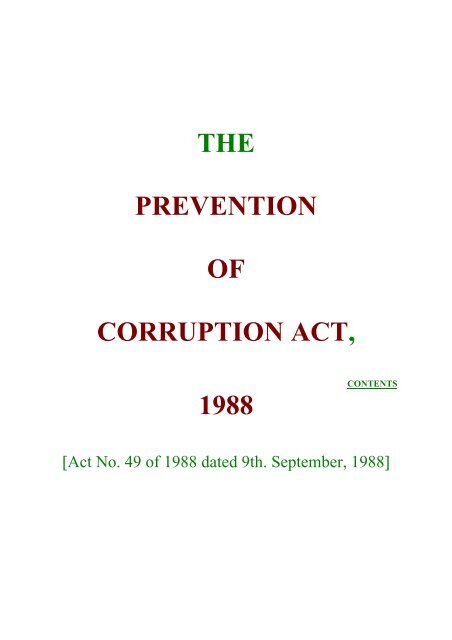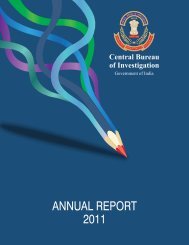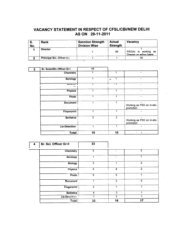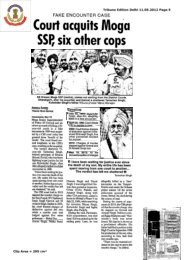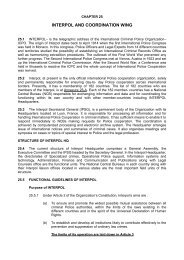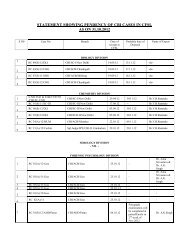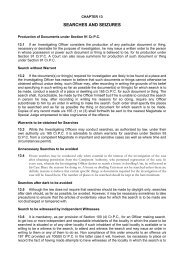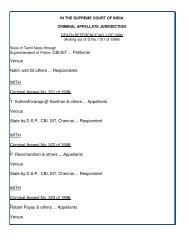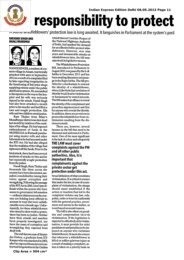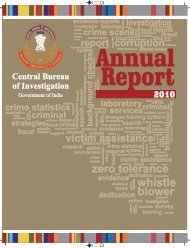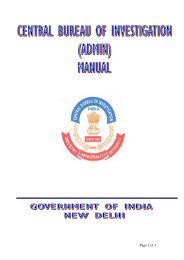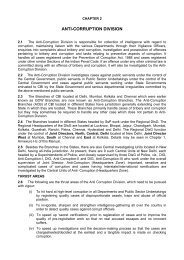Prevention of Corruption Act, 1988
Prevention of Corruption Act, 1988
Prevention of Corruption Act, 1988
Create successful ePaper yourself
Turn your PDF publications into a flip-book with our unique Google optimized e-Paper software.
6. Power to try summarily(1) Where a special Judge tries any <strong>of</strong>fence specified in sub-section (1) <strong>of</strong> section 3, allegedto have been committed by a public servant in relation to the contravention <strong>of</strong> any specialorder referred to in sub-section (1) <strong>of</strong> section 12A <strong>of</strong> the Essential Commodities <strong>Act</strong>, 1955 or<strong>of</strong> an order referred to in clause (a) <strong>of</strong> sub-section (2) <strong>of</strong> that section, then, notwithstandinganything contained in sub-section (1) <strong>of</strong> section 5 <strong>of</strong> this <strong>Act</strong> or section 260 <strong>of</strong> the Code <strong>of</strong>Criminal Procedure, 1973, the special Judge shall try the <strong>of</strong>fence in a summary way, and theprovisions <strong>of</strong> sections 262 to 265 (both inclusive) <strong>of</strong> the said Code shall, as far as may be,apply to such trial:Provided that, in the case <strong>of</strong> any conviction in a summary trial under this section, it shall belawful for the special Judge to pass a sentence <strong>of</strong> imprisonment for a term not exceeding oneyear:Provided further that when at the commencement <strong>of</strong>, or in the course <strong>of</strong>, a summary trialunder this section, it appears to the special Judge that the nature <strong>of</strong> the case is such that asentence <strong>of</strong> imprisonment for a term exceeding one year may have to be passed or that it is,for any other reason, undesirable to try the case summarily, the special Judge shall, afterhearing the parties, record an order to that effect and thereafter recall any witnesses who mayhave been examined and proceed to hear or re-hear the case in accordance with the procedureprescribed by the said Code for the trial <strong>of</strong> warrant cases by Magistrates.(2) Notwithstanding anything to the contrary contained in this <strong>Act</strong> or in the code <strong>of</strong> CriminalProcedure, 1973, there shall be no appeal by a convicted person in any case tried summarilyunder this section in which the special Judge passes a sentence <strong>of</strong> imprisonment notexceeding one month, and <strong>of</strong> fine not exceeding two thousand rupees whether or not anyorder under section 452 <strong>of</strong> the said Code is made in addition to such sentence, but an appealshall lie where any sentence in excess <strong>of</strong> the aforesaid limits is passed by the special Judge.
CHAPTER III:OFFENCES AND PENALTIES7. Public servant taking gratification other than legal remuneration in respect <strong>of</strong> an<strong>of</strong>ficial actWhoever, being, or expecting to be a public servant, accepts or obtains or agrees to accept orattempts to obtain from any person, for himself or for any other person, any gratificationwhatever, other than legal remuneration, as a motive or reward for doing or forbearing to doany <strong>of</strong>ficial act or for showing or forbearing to show, in the exercise <strong>of</strong> his <strong>of</strong>ficial functions,favour or disfavour to any person or for rendering or attempting to render any service ordisservice to any person, with the Central Government or any State Government orParliament or the Legislature <strong>of</strong> any State or with any local authority, corporation orGovernment company referred to in clause (c) <strong>of</strong> section 2, or with any public servant,whether named or otherwise, shall be punishable with imprisonment which shall be not lessthan six months but which may extend to five years and shall also be liable to fine.Explanations.-(a) "Expecting to be a public servant." If a person not expecting to be in <strong>of</strong>fice obtains agratification by deceiving others into a belief that he is about to be in <strong>of</strong>fice, and that he willthen serve them, he may be guilty <strong>of</strong> cheating, but he is not guilty <strong>of</strong> the <strong>of</strong>fence defined inthis section.(b) "Gratification." The word "gratification" is not restricted to pecuniary gratifications or togratifications estimable in money.(c) "Legal remuneration." The words "legal remuneration" are not restricted to remunerationwhich a public servant can lawfully demand, but include all remuneration which he ispermitted by the Government or the organisation, which he serves, to accept.(d) "A motive or reward for doing." A person who receives a gratification as a motive orreward for doing what he does not intend or is not in a position to do, or has not done, comeswithin this expression.(e) Where a public servant induces a person erroneously to believe that his influence with theGovernment has obtained a title for that person and thus induces that person to give thepublic servant, money or any other gratification as a reward for this service, the publicservant has committed an <strong>of</strong>fence under this section.8. Taking gratification, in order, by corrupt or illegal means, to influence public servantWhoever accepts or obtains, or agrees to accept, or attempts to obtain, from any person, forhimself or for any other person, any gratification whatever as a motive or reward forinducing, by corrupt or illegal means, any public servant, whether named or otherwise, to door to forbear to do any <strong>of</strong>ficial act, or in the exercise <strong>of</strong> the <strong>of</strong>ficial functions <strong>of</strong> such public
servant to show favour or disfavour to any person, or to render or attempt to render anyservice or disservice to any person with the Central Government or any State Government orParliament or the Legislature <strong>of</strong> any State or with any local authority, corporation orGovernment company referred to in clause (c) <strong>of</strong> section 2, or with any public servant,whether named or otherwise, shall be punishable with imprisonment for a term which shall benot less than six months but which may extend to five years and shall also be liable to fine.9. Taking gratification, for exercise <strong>of</strong> personal influence with public servantWhoever accepts or obtains or agrees to accept or attempts to obtain, from any person, forhimself or for any other person, any gratification whatever, as a motive or reward forinducing, by the exercise <strong>of</strong> personal influence, any public servant whether named orotherwise to do or to forbear to do any <strong>of</strong>ficial act, or in the exercise <strong>of</strong> the <strong>of</strong>ficial functions<strong>of</strong> such public servant to show favour or disfavour to any person, or to render or attempt torender any service or disservice to any person with the Central Government or any StateGovernment or Parliament or the Legislature <strong>of</strong> any State or with any local authority,corporation or Government company referred to in clause (c) <strong>of</strong> section 2, or with any publicservant, whether named or otherwise, shall be punishable with imprisonment for a termwhich shall be not less than six months but which may extend. to five years and shall also beliable to fine.10. Punishment for abetment by public servant <strong>of</strong> <strong>of</strong>fences defined in section 8 or 9Whoever, being a public servant, in respect <strong>of</strong> whom either <strong>of</strong> the <strong>of</strong>fences defined in section8 or section 9 is committed, abets the <strong>of</strong>fence, whether or not that <strong>of</strong>fence is committed inconsequence <strong>of</strong> that abetment, shall be punishable with imprisonment for a term which shallbe not less than six months but which may extend to five years and shall also be liable to fine.11. Public servant obtaining valuable thing, without consideration from personconcerned in proceeding or business transacted by such public servantWhoever, being a public servant, accepts or obtains or agrees to accept or attempts to obtainfor himself, or for any other person, any valuable thing without consideration, or for aconsideration which he knows to be inadequate, from any person whom he knows to havebeen, or to be, or to be likely to be concerned in any proceeding or business transacted orabout to be transacted by such public servant, or having any connection with the <strong>of</strong>ficialfunctions <strong>of</strong> himself or <strong>of</strong> any public servant to whom he is subordinate, or from any personwhom he knows to be interested in or related to the person so concerned, shall be punishablewith imprisonment for a term which shall be not less than six months but which may extendto five years and shall also be liable to fine.12. Punishment for abetment <strong>of</strong> <strong>of</strong>fences defined in section 7 or 11Whoever abets any <strong>of</strong>fence punishable under section 7 or section 11 whether or not that<strong>of</strong>fence is committed in consequence <strong>of</strong> that abetment, shall be punishable with imprisonmentfor a term which shall be not less than six months but which may extend to five years andshall also be liable to fine,
13. Criminal misconduct by a public servant(1) A public servant is said to commit the <strong>of</strong>fence <strong>of</strong> criminal misconduct,-(a) if he habitually accepts or obtains or agrees to accept or attempts to obtain from anyperson for himself or for any other person any gratification other than legal remuneration as amotive or reward such as is mentioned in section 7; or(b) if he habitually accepts or obtains or agrees to accept or attempts to obtain for himself orfor any other person, any valuable thing without consideration or for a consideration whichhe knows to be inadequate from any person whom he knows to have been, or to be, or to belikely to be concerned in any proceeding or business transacted or about to be transacted byhim, or having any connection with the <strong>of</strong>ficial functions <strong>of</strong> himself or <strong>of</strong> any public servantto whom he is subordinate, or from any person whom he knows to be interested in or relatedto the person so concerned; or(c) if he dishonestly or fraudulently misappropriates or otherwise converts for his own useany property entrusted to him or under his control as a public servant or allows any otherperson so to do; or(d) if he,-(i) by corrupt or illegal means, obtains for himself or for any other person any valuable thingor pecuniary advantage; or(ii) by abusing his position as a public servant, obtains for himself or for any other person anyvaluable thing or pecuniary advantage; or(iii) while holding <strong>of</strong>fice as a public servant, obtains for any person any valuable thing orpecuniary advantage without any public interest; or(e) if he or any person on his behalf, is in possession or has, at any time during the period <strong>of</strong>his <strong>of</strong>fice, been in possession for which the public servant cannot satisfactorily account, <strong>of</strong>pecuniary resources or property disproportionate to his known sources <strong>of</strong> income.Explanation.-For the purposes <strong>of</strong> this section, "known sources <strong>of</strong> income" means incomereceived from any lawful source and such receipt has been intimated in accordance with theprovisions <strong>of</strong> any law, rules or orders for the time being applicable to a public servant.(2) Any public servant who commits criminal misconduct shall be punishable withimprisonment for a term which shall be not less than one year but which may extend to sevenyears and shall also be liable to fine.14. Habitual committing <strong>of</strong> <strong>of</strong>fence under sections 8, 9 and 12Whoever habitually commits-(a) an <strong>of</strong>fence punishable under section 8 or section 9; or(b) an <strong>of</strong>fence punishable under section 12,
shall be punishable with imprisonment for a term which shall be not less than two years butwhich may extend to seven years and shall also be liable to fine.15. Punishment for attemptWhoever attempts to commit an <strong>of</strong>fence referred to in clause (c) or clause (d) <strong>of</strong> sub-section(1) <strong>of</strong> section 13 shall be punishable with imprisonment for a term which may extend to threeyears and with fine.16. Matters to be taken into consideration for fixing fineWhere a sentence <strong>of</strong> fine is imposed. under sub-section (2) <strong>of</strong> section 13 or section 14, thecourt in fixing the amount <strong>of</strong> the fine shall taken into consideration the amount or the value <strong>of</strong>the property, if any, which the accused person has obtained by committing the <strong>of</strong>fence orwhere the conviction is for an <strong>of</strong>fence referred to in clause (e) <strong>of</strong> sub-section (1) <strong>of</strong> section13, the pecuniary resources or property referred to in that clause for which the accused personis unable to account satisfactorily.
CHAPTER IV:INVESTIGATION INTO CASES UNDER THE ACT17. Persons authorised to investigateNotwithstanding anything contained in the Code <strong>of</strong> Criminal Procedure, 1973, no police<strong>of</strong>ficer below the rank,-(a) in the case <strong>of</strong> the Delhi Special Police Establishment, <strong>of</strong> an Inspector <strong>of</strong> Police;(b) in the metropolitan areas <strong>of</strong> Bombay, Calcutta, Madras and Ahmedabad and in any othermetropolitan area notified as such under sub-section (1) <strong>of</strong> section 8 <strong>of</strong> the Code <strong>of</strong> CriminalProcedure, 1973, <strong>of</strong> an Assistant Commissioner <strong>of</strong> Police;(c) elsewhere, <strong>of</strong> a Deputy Superintendent <strong>of</strong> Police or a police <strong>of</strong>ficer <strong>of</strong> equivalent rank,shall investigate any <strong>of</strong>fence punishable under this <strong>Act</strong> without the order <strong>of</strong> a MetropolitanMagistrate or a Magistrate <strong>of</strong> the first class, as the case may be, or make any arrest thereforwithout a warrant:Provided that if a police <strong>of</strong>ficer not below the rank <strong>of</strong> an Inspector <strong>of</strong> Police is authorised bythe State Government in this behalf by general or special order, he may also investigate anysuch <strong>of</strong>fence without the order <strong>of</strong> a Metropolitan Magistrate or a Magistrate <strong>of</strong> the first class,as the case may be, or make arrest therefor without a warrant:Provided further that an <strong>of</strong>fence referred to in clause (e) <strong>of</strong> sub-section (1) <strong>of</strong> section 13 shallnot be investigated without the older <strong>of</strong> a police <strong>of</strong>ficer not below the rank <strong>of</strong> aSuperintendent <strong>of</strong> Police.18. Power to inspect bankers' booksIf from information received or otherwise, a police <strong>of</strong>ficer has reason to suspect thecommission <strong>of</strong> an <strong>of</strong>fence which he is empowered to investigate under section 17 andconsiders that for the purpose <strong>of</strong> investigation or inquiry into such <strong>of</strong>fence, it is necessary toinspect any bankers’ books, then, notwithstanding anything contained in any law for the timebeing in force, he may inspect any bankers’ books in so far as they relate to the accounts <strong>of</strong>the persons suspected to have committed that <strong>of</strong>fence or <strong>of</strong> any other person suspected to beholding money on behalf <strong>of</strong> such person, and take or cause to be taken certified copies <strong>of</strong> therelevant entries therefrom, and the bank concerned shall be bound to assist the police <strong>of</strong>ficerin the exercise <strong>of</strong> his powers under this section:Provided that no power under this section in relation to the accounts <strong>of</strong> any person shall beexercised by a police <strong>of</strong>ficer below the rank <strong>of</strong> a Superintendent <strong>of</strong> Police, unless he isspecially authorised in this behalf by a police <strong>of</strong>ficer <strong>of</strong> or above the rank <strong>of</strong> a superintendent<strong>of</strong> Police.Explanation-In this section, the expressions "bank" and "bankers’ books" shall have themeanings respectively assigned to them in the Bankers’ Books Evidence <strong>Act</strong>, 1891.
19. Previous sanction necessary for prosecution(1) No court shall take cognizance <strong>of</strong> an <strong>of</strong>fence punishable under section 7, 10, 11, 13 and15 alleged to have been committed by a public servant, except with the previous sanction,-(a) in the case <strong>of</strong> a person who is employed in connection with the affairs <strong>of</strong> the Union and isnot removable from his <strong>of</strong>fice save by or with the sanction <strong>of</strong> the Central Government, <strong>of</strong> thatGovernment;(b) in the case <strong>of</strong> a person who is employed in connection with the affairs <strong>of</strong> a State and is notremovable from his <strong>of</strong>fice save by or with the sanction <strong>of</strong> the State Government, <strong>of</strong> thatGovernment;(c) in the case <strong>of</strong> any other person, <strong>of</strong> the authority competent to remove him from his <strong>of</strong>fice.(2) Where for any reason whatsoever any doubt arises as to whether the previous sanction asrequired under sub-section (1) should be given by the Central Government or the StateGovernment or any other authority, such sanction shall be given by that Government orauthority which would have been competent to remove the public servant from his <strong>of</strong>fice atthe time when the <strong>of</strong>fence was alleged to have been committed.(3) Notwithstanding anything contained in the code <strong>of</strong> Criminal Procedure, 1973,-(a) no finding, sentence or order passed by a special Judge shall be reversed or altered by aCourt in appeal, confirmation or revision on the ground <strong>of</strong> the absence <strong>of</strong>, or any error,omission or irregularity in, the sanction required under sub-section (1), unless in the opinion<strong>of</strong> that court, a failure <strong>of</strong> justice has in fact been occasioned thereby;(b) no court shall stay the proceedings under this <strong>Act</strong> on the ground <strong>of</strong> any error, omission orirregularity in the sanction granted by the authority, unless it is satisfied that such error,omission or irregularity has resulted in a failure <strong>of</strong> justice;(c) no court shall stay the proceedings under this <strong>Act</strong> on any other ground and no court shallexercise the powers <strong>of</strong> revision in relation to any interlocutory order passed in any inquiry,trial, appeal or other proceedings.(4) In determining under sub-section (3) whether the absence <strong>of</strong>, or any error, omission orirregularity in, such sanction has occasioned or resulted in a failure <strong>of</strong> justice the court shallhave regard to the fact whether the objection could and should have been raised at any earlierstage in the proceedings.Explanation.-For the purposes <strong>of</strong> this section,-(a) error includes competency <strong>of</strong> the authority to grant sanction;(b) a sanction required for prosecution includes reference to any requirement that theprosecution shall be at the instance <strong>of</strong> a specified authority or with the sanction <strong>of</strong> a specifiedperson or any requirement <strong>of</strong> a similar nature.
20. Presumption where public servant accepts gratification other than legalremuneration(1) Where, in any trial <strong>of</strong> an <strong>of</strong>fence punishable under section 7 or section 11 or clause (a) orclause (b) <strong>of</strong> sub-section (1) <strong>of</strong> section 13 it is proved that an accused person has accepted orobtained or has agreed to accept or attempted to obtain for himself, or for any other person,any gratification (other than legal remuneration) or any valuable thing from any person, itshall be presumed, unless the contrary is proved, that he accepted or obtained or agreed toaccept or attempted to obtain that gratification or that valuable thing, as the case may be, as amotive or reward such as is mentioned in section 7 or, as the case may be, withoutconsideration or for a consideration which he knows to be Inadequate.(2) Where in any trial <strong>of</strong> an <strong>of</strong>fence punishable under section 12 or under clause (b) <strong>of</strong> section14, it is proved that any gratification (other than legal remuneration) or any valuable thing hasbeen given or <strong>of</strong>fered to be given or attempted to be given by an accused person, it shall bepresumed, unless the contrary is proved, that he gave or <strong>of</strong>fered to give or attempted to givethat gratification or that valuable thing, as the case may be, as a motive or reward such as ismentioned in section 7, or, as the case may be, without consideration or for a considerationwhich he knows to be inadequate.(3) Notwithstanding anything contained in sub-section (1) and (2), the court may decline todraw the presumption referred to in either <strong>of</strong> the said sub-sections, if the gratification or thingaforesaid is, in its opinion, so trivial that no inference <strong>of</strong> corruption may fairly be drawn.21. Accused person to be a competent witnessAny person charged with an <strong>of</strong>fence punishable under this <strong>Act</strong>, shall be a competent witnessfor the defence and may give evidence on oath in dispro<strong>of</strong> <strong>of</strong> the charges made against him orany person charged together with him at the same trial:Provided that-(a) he shall not be called as a witness except at his own request;(b) his failure to give evidence shall not be made the subject <strong>of</strong> any comment by theprosecution or give rise to any presumption against himself or any person charged togetherwith him at the same trial;(c) he shall not be asked, and if asked shall not be required to answer, any question tending toshow that he has committed or been convicted <strong>of</strong> any <strong>of</strong>fence other than the <strong>of</strong>fence withwhich he is charged, or is <strong>of</strong> bad character, unless-(i) the pro<strong>of</strong> that he has committed or been convicted <strong>of</strong> such <strong>of</strong>fence is admissible evidenceto that he is guilty <strong>of</strong> the <strong>of</strong>fence with which he is charged, or(ii) he has personally or by his pleader asked any question <strong>of</strong> any witness for the prosecutionwith a view to establish his own good character, or has given evidence <strong>of</strong> his good character,or the nature or conduct <strong>of</strong> the defence is such as to involve imputations on the character <strong>of</strong>the prosecutor or <strong>of</strong> any witness for the prosecution, or(iii) he has given evidence against any other person charged with the same <strong>of</strong>fence.
22. The Code <strong>of</strong> Criminal Procedure, 1973 to apply subject to certain modificationsThe provisions <strong>of</strong> the Code <strong>of</strong> Criminal Procedure, 1973, shall in their application to anyproceeding in relation to an <strong>of</strong>fence punishable under this <strong>Act</strong> have effect as if,-(a) in sub-section (1) <strong>of</strong> section 243, for the words "The accused shall then be called upon",the words "The accused shall then be required to give in writing at once or within. such timeas the Court may allow, a list <strong>of</strong> the persons (if any) whom he proposes to examine as hiswitnesses and <strong>of</strong> the documents (if any) on which he proposes to rely and he shall then becalled upon" had been substituted;(b) in sub-section (2) <strong>of</strong> section 309, after the 'third proviso, the following proviso had beeninserted, namely:-"Provided also that the proceeding shall not be adjourned or postponed merely on the groundthat an application under section 397 has been made by a party to the proceeding.";(c) after sub-section (2) <strong>of</strong> section 317, the following sub-section had been inserted, namely:-"(3) Notwithstanding anything contained in sub-section (1) or sub-section (2), the Judge may,if he thinks fit and for reasons to be recorded by him, proceed with inquiry or trial in theabsence <strong>of</strong> the accused or his pleader and record the evidence <strong>of</strong> any witness subject to theright <strong>of</strong> the accused to recall the witness for cross-examination.";(d) in sub-section (1) <strong>of</strong> section 397, before the Explanation, the following proviso had beeninserted, namely:-"Provided that where the powers under this section are exercised by a Court on an applicationmade by a party to such proceedings, the Court shall not ordinarily call for the record <strong>of</strong> theproceedings:-(a) without giving the other party an opportunity <strong>of</strong> showing cause why the record should notbe called for; or(b) if it is satisfied that an examination <strong>of</strong> the record <strong>of</strong> the proceedings may be made fromthe certified copies.".23. Particulars in a charge in relation to an <strong>of</strong>fence under section 13(1) (c).Notwithstanding anything contained in the Code <strong>of</strong> Criminal Procedure, 1973, when anaccused is charged with an <strong>of</strong>fence under clause (c) <strong>of</strong> sub-section (1) <strong>of</strong> section 13, it shallbe sufficient to describe in the charge the property in respect <strong>of</strong> which the <strong>of</strong>fence is allegedto have been committed , and the dates between which the <strong>of</strong>fence is alleged to have beencommitted, without specifying particular items or exact dates, and the charge so framed shallbe deemed to be a charge <strong>of</strong> one <strong>of</strong>fence within the meaning <strong>of</strong> section 219 <strong>of</strong> the said Code:Provided that the time included between the first and last <strong>of</strong> such dates shall not exceed oneyear.
24. Statement by bribe giver not to subject him to prosecutionNotwithstanding anything contained in any law for the time being in force, a statement madeby a person in any proceeding against a public servant for an <strong>of</strong>fence under sections 7 to 11or under section 13 or section 15, that he <strong>of</strong>fered or agreed to <strong>of</strong>fer any gratification (otherthan legal remuneration) or any valuable thing to the public servant, shall not subject suchperson to a prosecution under section 12.25. Military, Naval and Air Force or other law not to be affected(1) Nothing in this <strong>Act</strong> shall affect the jurisdiction exercisable by, or the procedure applicableto, any court or other authority under the Army <strong>Act</strong>. 1950, the Air Force <strong>Act</strong>, 1950, the Navy<strong>Act</strong>, 1957, the Border Security Force <strong>Act</strong>, 1968, the Coast Guard <strong>Act</strong>, 1978 and the NationalSecurity Guard <strong>Act</strong>, 1986.(2) For the removal <strong>of</strong> doubts, it is hereby declared that for the purposes <strong>of</strong> any such law as isreferred to in sub-section (1), the court <strong>of</strong> a special Judge shall be deemed to be a court <strong>of</strong>ordinary criminal justice.26. Special Judges appointed under <strong>Act</strong> 46 <strong>of</strong> 1952 to be special Judges appointed underthis <strong>Act</strong>Every special Judge appointed under the Criminal Law Amendment <strong>Act</strong>, 1952,, for any areaor areas and is holding <strong>of</strong>fice on the commencement <strong>of</strong> this <strong>Act</strong> shall be deemed to be aspecial Judge appointed under section 3 <strong>of</strong> this <strong>Act</strong> for that area or areas and, accordingly, onand from such commencement, every such Judge shall continue to deal with all theproceedings pending before him on such commencement in accordance with the provisions <strong>of</strong>this <strong>Act</strong>.27. Appeal and revisionSubject to the provisions <strong>of</strong> this <strong>Act</strong>, the High Court may exercise, so far as they may beapplicable, all the powers <strong>of</strong> appeal and revision conferred by the Code <strong>of</strong> CriminalProcedure, 1973 on a High Court as if the court <strong>of</strong> special Judge were a court <strong>of</strong> Sessiontrying cases within the local limits <strong>of</strong> the High Court.28. <strong>Act</strong> to be in addition to any other lawThe provisions <strong>of</strong> this <strong>Act</strong> shall be in addition to, and not in derogation <strong>of</strong>, any other law forthe time being in force, and nothing contained herein shall exempt any public servant fromany proceeding which might, apart from this <strong>Act</strong>, be instituted against him.
29. Amendment <strong>of</strong> the Ordinance 38 <strong>of</strong> 1944In the Criminal Law Amendment Ordinance, 1944,-(a) in sub-section (1) <strong>of</strong> section 3, sub-section (1) <strong>of</strong> sector 9, clause (a) <strong>of</strong> section 10, subsection(1) <strong>of</strong> section 11 and sub-section (1) <strong>of</strong> section 13, for the words "State Government",wherever they occur, the words "State Government or, as the case may be, the CentralGovernment" shall be substituted;(b) in section 10, in clause (a), for the words " three months", the words "one year" shall besubstituted;(c) in the Schedule,-(i) paragraph 1 shall be omitted;(ii) in paragraphs 2 and 4,-(a) after the words "a local authority", the words and figures "or a corporation established byor under a Central, Provincial or State <strong>Act</strong>, or an authority or a body owned or controlled oraided by Government or a Government company as defined in section 617 <strong>of</strong> the Companies<strong>Act</strong>, 1956 or a society aided by such corporation, authority. body or Government company"shall be inserted;(b) after the words "or authority", the words "or corporation or body or Government companyor society" shall be inserted;(iii) for paragraph 4A, the following paragraph shall be substituted, namely: -"4A. An <strong>of</strong>fence punishable under the <strong>Prevention</strong> <strong>of</strong> <strong>Corruption</strong> <strong>Act</strong>, <strong>1988</strong>.";(iv) in paragraph 5, for the words and figures "items 2, 3 and 4", the words, figures and letter"items 2, 3, 4 and 4A" shall be substituted.30. Repeal and saving(1) The <strong>Prevention</strong> <strong>of</strong> <strong>Corruption</strong> <strong>Act</strong>, 1947 and the Criminal Law Amendment <strong>Act</strong>, 1952 arehereby repealed.(2) Notwithstanding such repeal, but without prejudice to the application <strong>of</strong> section 6 <strong>of</strong> theGeneral Clauses <strong>Act</strong>, 1897, anything done or any action taken or purported to 'have beendone or taken under or in pursuance <strong>of</strong> the <strong>Act</strong>s so repealed shall, in so far as it is notinconsistent with the provisions <strong>of</strong> this <strong>Act</strong>, be deemed to have been done or taken, under orin pursuance <strong>of</strong> the corresponding provision <strong>of</strong> this <strong>Act</strong>.
31. Omission <strong>of</strong> certain sections <strong>of</strong> <strong>Act</strong> 45 <strong>of</strong> 1860Sections 161 to 165A (both inclusive) <strong>of</strong> the Indian Penal Code shall be omitted, and section6 <strong>of</strong> the General Clauses <strong>Act</strong>, 1897, shall apply to such omission as if the said sections hadbeen repealed by a Central <strong>Act</strong>.


